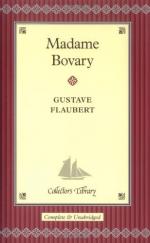|
This section contains 3,496 words (approx. 12 pages at 300 words per page) |

|
Realism and Romanticism in Gustave Flaubert's Madame Bovary
Summary: The main focus is on the conceptual elements of Flaubert's Madame Bovary, with secondary focus on Romanticism as presented by Wordsworth and Bronte - contrasts realism and romanticism.
Madame Bovary is a reaction to the writings of the Romantics. Through this novel, Gustave Flaubert tells a tale of a country woman's mundane life that gets filled with the notions of romantic love. She soon slips so far into this fantasy world of romantic love that she becomes morally corrupt and is detached from the world she lives in. The phases of her life are depicted in a character that shows up later in the novel, the beggar, who starts off singing songs of beautiful women to singing songs of a vulgar, sexual nature. His physical ugliness displays Emma's moral corruption, and the change in the theme of his songs shows the path of her life and foreshadows her tragic end. His detailed depictions of this country woman and the world around him are typical of Realism and his use of symbolism, as shown in the example...
|
This section contains 3,496 words (approx. 12 pages at 300 words per page) |

|


